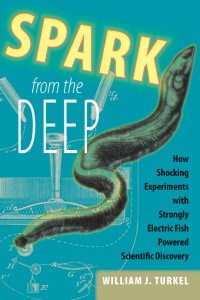Events of Interest
William J. Turkel, ” The Hands-On Imperative”- Mon 10/21, 4:15pm-5:30pm, Skylight Room (9100)
On 17, Oct 2013 | In Events of Interest | By Amanda Licastro
Please join CUNY DHI and the Digital Praxis Seminar in welcoming William Turkel for a talk on physical computing and the humanities.
This event will take place Monday, 10/21, from 4:15pm-5:30pm, in the Skylight Room (9100).
This event is free to attend and open to the public. We request you RSVP here, but registration is not mandatory:
http://cunydhi-turkel.eventbrite.com/
William Turkel is engaged in computational history, big history, STS, physical computing, desktop fabrication and electronics. His new monograph, Spark from the Deep, is now available. Turkel is currently working on a study of attempts to build a self-replicating device, from the machine tools of the Industrial Revolution to the RepRaps of today. As part of this research, he has built a series of 3D printers and other CNC tools. The other project Turkel is working on is a study of mid-20th-century analog electronic computing. Turkel teaches Max 6 programming to undergraduates in Western’s new digital humanities option, and to grad students in the interactive exhibit design course. Turkel is also teaching a new graduate course on digital research methods that makes use of command line tools in Linux virtual machines. You can find him on Twitter at @williamjturkel
Open Access Event: Open Access Scholarly Publishing as Thought and Action
On 19, Sep 2011 | In Events of Interest | By Matthew K. Gold
Reposted from the <a href=”https://openaccess.commons.gc.cuny.edu/2011/09/19/open-access-scholarly-publishing-as-thought-and-action/”>Open Access @ CUNY blog</a>:
Friday, October 28, 2011
5-7pm
CUNY Graduate Center—Room 9204
free and open to the public
As a culmination of CUNY Open Access Week 2011, and in conjunction with the CUNY Digital Humanities Initiative, this panel will unravel issues surrounding open access scholarly publishing. Our panelists will share their inspiration for becoming open access advocates, their thinking about adopting particular licenses for their work, and the processes through which they have liberated their scholarship—from their perspectives as authors, editors and publishers.
The panel will include:
Members of the Radical Teacher editorial collective: Emily Drabinski, is an Instruction Librarian at Long Island University, Brooklyn, James Davis and Joseph Entin, both Associate Professors of English at Brooklyn College. Radical Teacher is a socialist, feminist, and anti-racist journal about the theory and practice of teaching. Published in print since 1975, the journal has recently decided to transition to an open access model.
Matthew K. Gold is an Assistant Professor of English at New York City College of Technology and of Interactive Technology and Pedagogy at the CUNY Graduate Center, where he serves as Advisor to the Provost for Master’s Programs and Digital Initiatives. He recently edited the book Debates in the Digital Humanities, which will be published through the University of Minnesota Press in January 2012 both as a printed text and an expanded, open-access edition on the web.
Michael Mandiberg is an artist and Assistant Professor of Media Culture at the College of Staten Island/CUNY and on the Doctoral Faculty of the Interactive Technology and Pedagogy Certificate Program at the CUNY Graduate Center. He is the coauthor ofDigital Foundations: An Intro to Media Design, Collaborative Futures, and the editor ofThe Social Media Reader.
Trebor Scholz is a scholar, artist, professor, chair, organizer and chair of the conference series The Politics of Digital Culture at The New School in NYC. His forthcoming monograph with Polity offers a history of the Social Web and its Orwellian economies. In spring 2011, he co-authored From Mobile Playgrounds to Sweatshop City (with Laura Y. Liu). Scholz is the editor of two collections of essays, Learning Through Digital Media(iDC, 2011) and a volume on digital labor (Routledge, 2012). He also founded theInstitute for Distributed Creativity that is widely known for its online discussions of critical network culture.
For more information about Open Access publishing, and CUNY’s 2011 Open Access Week events, see the Open Access @ CUNY blog on the CUNY Academic Commons, or get in touch with Professor Alycia Sellie: asellie@brooklyn.cuny.edu
September 12: Cathy Davidson on “Now You See It: How the Brain Science of Attention Will Transform the Way We Live, Work, and Learn”
On 24, Jul 2011 | In Events of Interest | By Matthew K. Gold
This upcoming event at the GC will be of interest to many in our group: 
Monday, Sept. 12th, 6:30 -8:30 pm, Martin E. Segal Theater
Now You See It: How the Brain Science of Attention Will Transform the Way We Live, Work, and Learn
CATHY N. DAVIDSON is the John Hope Franklin Humanities Institute Professor of Interdisciplinary Studies at Duke University. She has published more than twenty books including Closing: The Life and Death of an American Factory and The Future of Thinking: Learning Institutions in a Digital Age. In December 2010, President Obama nominated Davidson to the National Council on the Humanities and she is currently awaiting confirmation by the Senate. She is the co-founder of HASTAC. JESSE PRINZ, Distinguished Professor of Philosophy, Graduate Center, will serve as discussant. Cosponsored by the Center for the Study of Women and Society and the Center for Humanities.
Digital Humanities and the Future of Libraries
On 07, Jun 2011 | In Events of Interest | By Matthew K. Gold
CUNY DHI members: Please check out this event next week at the New York Public Library:
NYPL Labs presents: Digital Humanities and the Future of Libraries
A conversation in honor of Dr. Paul LeClerc with:
Kari Kraus, Jon Orwant, Dot Porter and Doug Reside
Thursday June 16, 4-6pm at The New York Public Library
Stephen A. Schwarzman Building (42nd St. and 5th Ave.), South Court Auditorium
FREE and open to the public
Since the early days of the field, Digital Humanities practitioners have frequently found allies and collaborators in librarians and archivists. Many early digital humanities projects centered around organizing and making accessible information–two activities at the core of the mission of almost every library. Perhaps for this reason,many of the largest digital humanities centers are physically situated in and often at least partially funded by University libraries.
Nonetheless, the field has traditionally been led (with a few notable exceptions) by faculty from humanities departments rather than by library staff, and libraries have tended to isolate digital humanities centers as somewhat quarantined departments separate from the daily work of the institution. However, as both digital humanities and librarianship develop in the 21st century, there are indications that these walls of separation are beginning to erode. In this panel discussion, NYPL Digital Curator for the Performing Arts,Doug Reside, and three digital humanists from very different backgrounds will discuss the future of libraries and the digital humanities and how these two related, but as yet mostly separate fields, may (or may not) finally converge.
This event is held in honor of outgoing NYPL President Dr. Paul LeClerc, whose vision and passionate advocacy have advanced the frontiers of digital humanities innovation at the Library. The event is sponsored byNYPL Labs, a collaborative team of librarians, curators and technologists developing new ideas and tools for digital research.
Participants
KARI KRAUS is an assistant professor in the College of Information Studies and the Department of English at the University of Maryland. Her research and teaching interests focus on new media and the digital humanities, textual scholarship and print culture, digital preservation, transmedia storytelling, and game studies. Kraus is a local Co-PI on an Institute of Museum and Library Services grant for preserving virtual worlds; a Co-PI on an IMLS Digital Humanities Internship grant; and, with Derek Hansen (iSchool), the Co-Principal Investigator of an NSF grant to study Alternate Reality Games (ARGs) and transmedia storytelling in the service of education and design. In addition to the University of Maryland, she has taught at the University of Rochester and the Eastman School of Music, and in the Art and Visual Technology program at George Mason University.
JON ORWANTis Engineering Manager at Google, where he works on Book Search, Patent Search, visualizations, and the digital humanities, where he recently launched the Google Books Ngram Viewer. He’s the author or co-author of several books on programming, including the bestselling Programming Perl, and published an independent computer magazine. Before joining Google he was the CTO of O’Reilly & Associates and Director of Research for France Telecom. He received his doctorate from MIT’s Electronic Publishing Group in 1999.
DOT PORTER is currently the Associate Director for Content & Services in the Digital Library Program at Indiana University. Ms. Porter holds an MA in Medieval Studies and an MS in Library Science, although after receiving her MSLS rather than going to work in a library, she took a position in a digital humanities center. Over the next seven years she dedicated herself to working with humanities scholars to undertake faculty-driven digital projects. These projects often involved working closely with librarians, and with other scholars, such as computer scientists, as well, but the driving force behind the projects was always the humanities scholar. In June 2010, Ms. Porter came to work in the Digital Library Program at IU and was immediately stuck with a bit of culture shock. Although the technologies used in DL are very similar to those in DH, the aims and goals can be quite different, and working between the two can be an interesting, educational, and engaging experience.
DOUG RESIDE (moderator) became Digital Curator for the Performing Arts at New York Public Library in January of 2011 after serving for four and a half years on the directorial staff of the Maryland Institute for Technology in the Humanities (MITH) at the University of Maryland in College Park. He holds a BS in Computer Science and a BA, MA, and Ph.D. in English Literature. He has been a PI on three earlier startup grants (The Ajax XML Encoder, Music Theatre Online, and the Collaborative Ajax Modeling Platform) and the co-PI with Tanya Clement on the Off the Tracks workshop. Additionally, he is the original project director of the NEH Preservation and Access funded Text Image Linking Environment (TILE) which is scheduled for release in the summer of 2011.
Jason Kucsma
Acting Interim Director & Emerging Technologies Manager
Metropolitan New York Library Council
212.228.2320 x23
www.metro.org


 Welcome to the blog of the CUNY DHI, an effort to build momentum and community around Digital Humanities practitioners at CUNY. We hope you'll join us at our upcoming events and that you'll follow this blog to hear about the latest news in the field.
Welcome to the blog of the CUNY DHI, an effort to build momentum and community around Digital Humanities practitioners at CUNY. We hope you'll join us at our upcoming events and that you'll follow this blog to hear about the latest news in the field.



Recent Comments